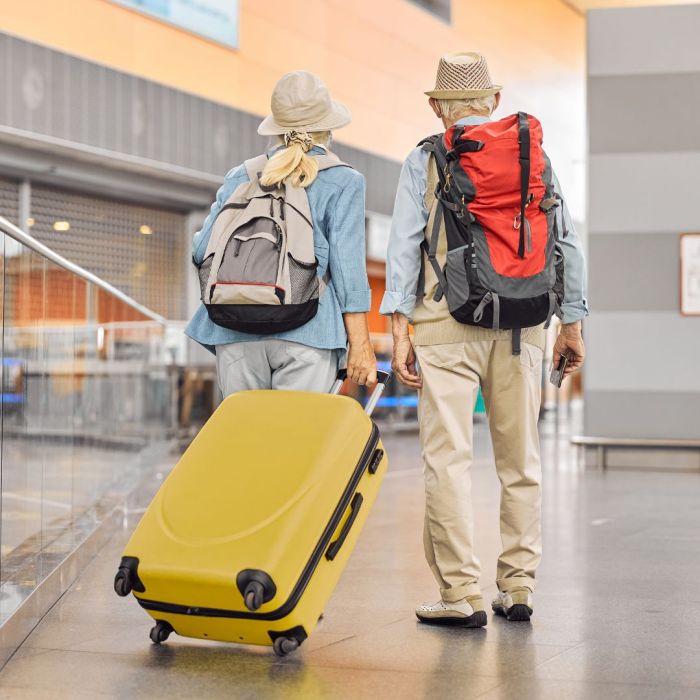Elder Travel: The silver-haired set is rewriting the travel narrative, trading bucket lists for bespoke experiences. This isn’t just about ticking off destinations; it’s about curated journeys designed for comfort, safety, and enriching engagement. From adventurous expeditions tailored to physical capabilities to relaxing wellness retreats, the options are as diverse as the travelers themselves. This exploration delves into the practicalities, considerations, and possibilities of crafting unforgettable journeys for mature adventurers.
This guide provides a comprehensive overview of elder travel, covering everything from planning and logistics to health and safety considerations, budgeting, accessible travel options, and marketing strategies for those in the industry. We examine different types of elder travel, such as adventure travel, cruises, and wellness retreats, comparing their physical demands and accessibility features. We also delve into the unique aspects of multigenerational travel, offering practical advice on creating age-appropriate itineraries and ensuring a smooth experience for all involved.
Financial planning, including insurance and budgeting, is addressed, along with resources for accessible travel and marketing tips to attract this growing demographic.
Health & Safety Considerations: Elder Travel

Planning a trip for senior travelers requires meticulous attention to health and safety. Failing to address potential health issues and safety concerns can significantly impact the enjoyment and overall success of the journey. This section details crucial precautions elders should take to ensure their physical and mental well-being while traveling.
Prioritizing health and safety is paramount for elder travelers. This involves proactive measures to manage existing conditions, prevent accidents, and ensure prompt access to medical care if needed. Careful planning and preparation are key to mitigating risks and promoting a positive travel experience.
Managing Chronic Health Conditions During Travel
Managing chronic conditions while traveling requires careful planning and preparation. Seniors should consult their physicians well in advance of their trip to discuss potential challenges and develop a comprehensive travel health plan. This plan should include medication management, dietary considerations, and strategies for managing potential exacerbations of existing conditions. For example, individuals with heart conditions should ensure they have readily available access to their medication and understand the signs and symptoms of a potential cardiac event.
Diabetics should pack sufficient supplies and plan meals accordingly to manage their blood sugar levels effectively.
Essential Medical Supplies and Medications
A well-stocked travel medical kit is crucial for senior travelers. This kit should include prescription medications (with copies of prescriptions), over-the-counter pain relievers, anti-diarrheal medication, antiseptic wipes, bandages, motion sickness remedies, and any other medications or supplies prescribed by their physician. Medications should be carried in their original containers, clearly labeled, and stored securely. It’s also advisable to carry a list of all medications and their dosages, along with contact information for their physician.
Seniors should ensure they have sufficient medication to cover the duration of their trip, plus a few extra days in case of delays. Consider packing medications in separate bags in case one bag is lost or misplaced.
Accident Prevention Strategies
Preventing accidents is crucial for ensuring a safe and enjoyable trip. This includes taking precautions to avoid falls, such as wearing appropriate footwear, using walking aids if necessary, and avoiding slippery surfaces. Seniors should also be mindful of their surroundings, avoiding crowded areas and poorly lit spaces. Staying hydrated and getting enough rest can also help prevent accidents by maintaining alertness and physical stamina.
Prioritizing safety during activities such as swimming or hiking is also important, and should include appropriate supervision or assistance.
Medical Emergency Preparedness, Elder Travel
A comprehensive plan for medical emergencies is essential. This involves having readily available contact information for local emergency services, as well as the traveler’s physician and family members. Consider purchasing travel insurance that covers medical emergencies and evacuation. Familiarizing oneself with the location of the nearest hospital or medical clinic is also prudent. A clearly visible medical alert bracelet or necklace can provide crucial information to first responders in case of an emergency.
| Health Concern | Prevention Strategies | Emergency Procedures | Contact Information |
|---|---|---|---|
| Heart Condition | Regular medication, low-sodium diet, avoid strenuous activity | Call emergency services immediately, administer prescribed medication | Cardiologist, family physician, emergency contact |
| Diabetes | Regular blood sugar monitoring, balanced diet, avoid sugary drinks | Administer glucose if necessary, call emergency services if blood sugar is dangerously low or high | Endocrinologist, family physician, emergency contact |
| Falls | Wear appropriate footwear, use walking aids if needed, avoid slippery surfaces | Call emergency services, immobilize injured area | Orthopedic surgeon, family physician, emergency contact |
| Asthma | Carry inhaler at all times, avoid triggers | Administer inhaler, call emergency services if symptoms worsen | Pulmonologist, family physician, emergency contact |
Budgeting & Financing Elder Travel
Planning a trip later in life requires careful consideration of finances. Elder travel, while enriching, demands a structured approach to budgeting and securing funding to ensure a comfortable and memorable experience. This section explores various financing methods and cost comparisons for different travel styles, providing a framework for creating a realistic budget.
Financing Elder Travel
Several avenues exist for financing elder travel. Savings specifically designated for travel are paramount. Many retirees diligently set aside funds throughout their working years, creating a dedicated travel fund. Supplementing savings, travel insurance offers crucial protection against unforeseen circumstances such as medical emergencies or trip cancellations. Comprehensive policies often cover medical expenses abroad, repatriation costs, and lost luggage, mitigating potential financial burdens.
Finally, government assistance programs, while varying by location, may offer subsidies or tax benefits for seniors engaging in travel, particularly if the trip involves educational or cultural enrichment. Eligibility criteria differ depending on the specific program and the traveler’s circumstances.
Cost Comparison of Elder Travel Styles
The cost of elder travel varies significantly depending on the chosen style. Independent travel, characterized by self-guided exploration and individual bookings, typically offers greater flexibility but can be more expensive overall due to the need to manage multiple bookings and potentially higher accommodation costs. Group tours, conversely, often provide cost savings through bulk bookings and pre-arranged itineraries. They may include transportation, accommodation, and guided excursions, resulting in a more predictable and potentially less expensive overall cost.
All-inclusive packages offer the greatest predictability, bundling almost all expenses into a single upfront price. While convenient, they often limit flexibility and might not cater to individual preferences as well as other travel styles.
Sample Budget for a Week-Long Elder Travel Experience
This sample budget Artikels the potential costs for a week-long trip to a moderately priced European city, such as Prague. Prices are estimates and can vary depending on the season and specific choices.
| Expense Category | Estimated Cost (USD) |
|---|---|
| Airfare (Round Trip) | $1,200 |
| Accommodation (7 nights, mid-range hotel) | $700 |
| Activities & Excursions (museums, tours, etc.) | $400 |
| Food & Drink (moderate dining) | $500 |
| Transportation (local transport, taxis) | $100 |
| Incidentals (souvenirs, tips, etc.) | $100 |
| Total Estimated Cost | $3,000 |
Note: This budget is a guideline only. Actual costs can vary significantly depending on travel style, destination, and individual preferences. It is crucial to factor in potential unexpected expenses and to adjust the budget accordingly.
Accessible Travel Options & Resources

Planning accessible travel for seniors requires careful consideration of individual needs and available resources. Navigating the complexities of transportation, accommodation, and attraction accessibility can be simplified by utilizing specialized agencies and readily available online tools. This section Artikels key resources and strategies to ensure a smooth and enjoyable travel experience for older adults with varying mobility needs.
Reputable Accessible Travel Agencies
Several organizations specialize in crafting accessible travel itineraries and providing comprehensive support services for seniors with disabilities. These agencies leverage their expertise to manage the logistical challenges associated with accessible travel, allowing seniors to focus on enjoying their trip.
- Accessible Adventures: This hypothetical agency (used for illustrative purposes as specific agency details would require constant updating) focuses on customized itineraries for seniors, incorporating accessible transportation, accommodations, and activities. Their services often include pre-trip consultations to assess individual needs and preferences, and on-site support throughout the journey. They may also offer specialized equipment rentals.
- Silver Linings Travel: Another hypothetical example, this agency specializes in group tours designed specifically for seniors with mobility limitations. Their tours often feature slower paces, shorter distances between activities, and readily accessible transportation options. They might also offer assistance with booking accessible accommodations and arranging for in-room accessibility features.
- Wheelchair Getaways: This fictional agency caters exclusively to wheelchair users, offering expert advice and support in planning international and domestic trips. They are particularly knowledgeable about navigating airports, public transportation, and various attractions with wheelchair accessibility challenges. They may have strong relationships with hotels and tour operators known for their commitment to accessibility.
Finding Accessible Travel Options Online
The internet offers a wealth of resources for finding accessible travel options. For example, planning a trip to Rome, Italy, would involve using online search engines and specialized websites.To find accessible transportation, one could utilize Rome’s public transportation website (a hypothetical example, replace with the actual website address if available) to check for accessibility features on buses, trams, and the metro.
Many websites offer real-time information about accessibility features on trains and buses. Websites dedicated to accessible tourism, often featuring user reviews and ratings of accessibility features, are also valuable. Taxi services offering wheelchair-accessible vehicles can also be easily located online.For accessible accommodations, booking websites frequently allow filtering by accessibility features. Searching for hotels in Rome with “wheelchair access,” “roll-in showers,” or “accessible rooms” will yield relevant results.
Reading guest reviews focusing on accessibility features is crucial to verify the accuracy of the provided information.To find accessible attractions, searching for “[attraction name] Rome accessibility” will often yield information about accessibility features, such as wheelchair ramps, elevators, and accessible restrooms. Official tourism websites for Rome will usually include accessibility information for major attractions. Online forums and travel blogs focusing on accessible travel often provide first-hand accounts and valuable tips.
Assistive Devices and Technologies
A range of assistive devices and technologies can significantly enhance the travel experience for seniors with mobility impairments or other disabilities.
- Lightweight wheelchairs and walkers: These portable devices offer greater mobility and independence, especially when navigating uneven terrain or crowded areas.
- Electric wheelchairs and scooters: These motorized devices provide greater range and assistance for individuals with significant mobility challenges. They are particularly helpful when exploring larger areas or covering longer distances.
- GPS navigation apps with accessibility features: These apps can provide turn-by-turn directions, including information about accessibility features along the route.
- Hearing aids and assistive listening devices: These devices can significantly improve communication and enhance the enjoyment of tours and performances.
- Magnifiers and large-print materials: These tools can aid seniors with visual impairments in reading maps, menus, and other essential travel documents.
Ultimately, elder travel is about embracing new adventures and creating lasting memories. By carefully considering the unique needs and preferences of older travelers, and by utilizing the resources and strategies Artikeld in this guide, individuals and organizations can ensure safe, enriching, and unforgettable travel experiences for this vibrant and growing demographic. Whether it’s a relaxing river cruise or an adventurous trek through the Andes, the possibilities are endless.
The key lies in thoughtful planning, prioritizing well-being, and embracing the spirit of exploration that defines the human experience, regardless of age.

